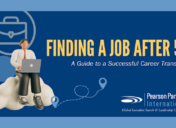Lisa Thompson, LPC, PCC – VP & Professional Career Coach, Pearson Partners International
 One of the questions you may be asking yourself is whether you should switch your industry or role in this time when many industries and companies are suffering due to the COVID-19 economic downturn. With record-high unemployment, those in a career transition may be wondering what else they can do. As executive recruiters, we are often asked how people can make a switch into a different industry or role. Obviously, the easiest and fastest career move is to look within the industries where you have experience and roles where you have proven yourself. However, if you are not progressing in your current field or the opportunities are limited, you may find that it’s time for a switch in order to get your career going in the right direction.
One of the questions you may be asking yourself is whether you should switch your industry or role in this time when many industries and companies are suffering due to the COVID-19 economic downturn. With record-high unemployment, those in a career transition may be wondering what else they can do. As executive recruiters, we are often asked how people can make a switch into a different industry or role. Obviously, the easiest and fastest career move is to look within the industries where you have experience and roles where you have proven yourself. However, if you are not progressing in your current field or the opportunities are limited, you may find that it’s time for a switch in order to get your career going in the right direction.
“Understanding your strengths and demonstrating that you can do the job and bring value to a new role or industry will help prepare you to pursue a change of industries and land the job that is right for you.”
Here are five tips to help you get started:
-
- Assess your skills. First, take a realistic assessment of your transferable experience and skills. The most successful career change in an economic downturn usually involves staying in the same function but transferring skills to a different industry. Be prepared to accommodate a potentially longer job search.
- Narrow your focus. Next, focus on targeting two to three industries at most. Do your research through industry trade publications and business news resources. Talk with people currently in the industry to familiarize yourself with:
-
-
- Current challenges and opportunities
- Key players, prospects and culture
- Current news and issues impacting the industry
- Industry terms, language and buzzwords
- The projected growth of the industry
-
-
- Define your value. Once you figure out what you are going after and why, the next step is to figure out the unique value that you offer in the marketplace. Get a thorough understanding of what your existing industry experience has in common with the targeted industry. Use the language of the new industry to reinforce the relevance of your career accomplishments. Translate your functional expertise into terms that will be meaningful to those in the new industry, with particular emphasis on quantifiable accomplishments and achievements using dollar amounts, percentages and other figures. You may be asked about your differentiators for positioning and what makes you uniquely qualified over other candidates with the industry background. Industry changers frequently bring the advantage of a fresh perspective and can use their experience to find innovative solutions. Other examples of experience that can make you stand out include:
-
-
- Transformation experience
- Merger and/or acquisition experience
- Public offering experience
- Successful sales record
- Sought-after contacts and connections
- “Best-of-Breed” in a highly recognized organization, regardless of industry
- Education, training or special certifications
-
-
- Build your network. To help make an industry switch, you must focus on building a network in the targeted industries. Networking is the most effective way to build a bridge into a new industry. Companies are more willing to take risks on someone referred to them by individuals who can attest to the candidate’s abilities and potential. In the case of switching industries, search firms are usually not the best source, since their clients pay them to identify individuals whose skills and experience exactly match their requirements.
- Launch your marketing strategy. Build your brand with a clear message on what you have to offer based on your experience and transferrable skills. Develop your marketing strategy and strategically target connections and opportunities in the industry. Consider doing some related consulting work to prove that your skills are transferable and to make sure you want to work in the industry. Focus on small and mid-sized companies that typically do not have the bench strength to fill key roles and are typically open to someone with a wide range of skills and backgrounds.
Final hiring decisions are made based on the candidates that are most convincing that they will produce results and/or bring in a viable solution. Understanding your strengths and demonstrating that you can do the job and bring value to a new role or industry will help prepare you to pursue a change of industries and land the job that is right for you.
















